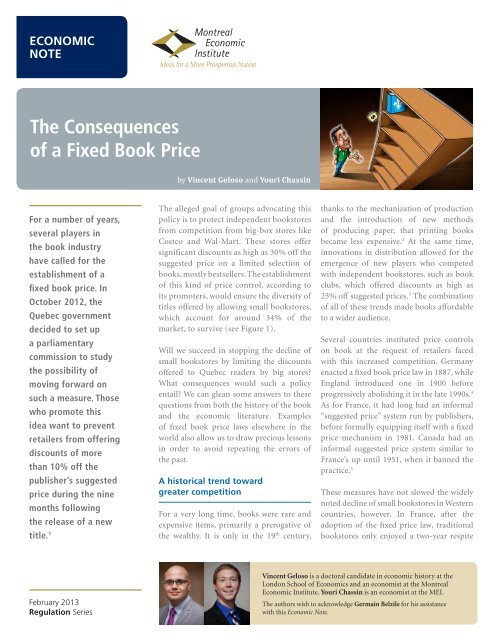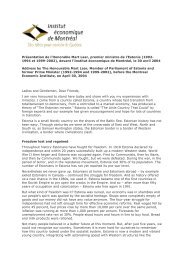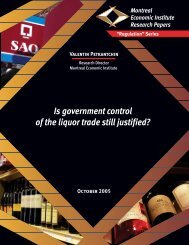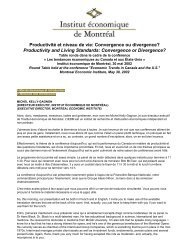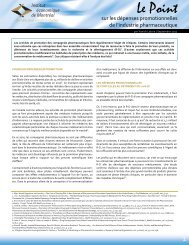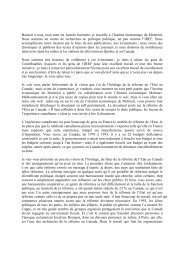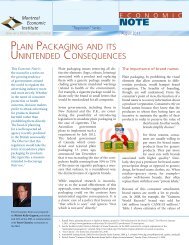The Consequences of a Fixed Book Price - IEDM
The Consequences of a Fixed Book Price - IEDM
The Consequences of a Fixed Book Price - IEDM
You also want an ePaper? Increase the reach of your titles
YUMPU automatically turns print PDFs into web optimized ePapers that Google loves.
ECONOMIC<br />
NOTE<br />
<strong>The</strong> <strong>Consequences</strong><br />
<strong>of</strong> a <strong>Fixed</strong> <strong>Book</strong> <strong>Price</strong><br />
by Vincent Geloso and Youri Chassin<br />
For a number <strong>of</strong> years,<br />
several players in<br />
the book industry<br />
have called for the<br />
establishment <strong>of</strong> a<br />
fixed book price. In<br />
October 2012, the<br />
Quebec government<br />
decided to set up<br />
a parliamentary<br />
commission to study<br />
the possibility <strong>of</strong><br />
moving forward on<br />
such a measure. Those<br />
who promote this<br />
idea want to prevent<br />
retailers from <strong>of</strong>fering<br />
discounts <strong>of</strong> more<br />
than 10% <strong>of</strong>f the<br />
publisher’s suggested<br />
price during the nine<br />
months following<br />
the release <strong>of</strong> a new<br />
title. 1<br />
<strong>The</strong> alleged goal <strong>of</strong> groups advocating this<br />
policy is to protect independent bookstores<br />
from competition from big-box stores like<br />
Costco and Wal-Mart. <strong>The</strong>se stores <strong>of</strong>fer<br />
significant discounts as high as 30% <strong>of</strong>f the<br />
suggested price on a limited selection <strong>of</strong><br />
books, mostly bestsellers. <strong>The</strong> establishment<br />
<strong>of</strong> this kind <strong>of</strong> price control, according to<br />
its promoters, would ensure the diversity <strong>of</strong><br />
titles <strong>of</strong>fered by allowing small bookstores,<br />
which account for around 34% <strong>of</strong> the<br />
market, to survive (see Figure 1).<br />
Will we succeed in stopping the decline <strong>of</strong><br />
small bookstores by limiting the discounts<br />
<strong>of</strong>fered to Quebec readers by big stores<br />
What consequences would such a policy<br />
entail We can glean some answers to these<br />
questions from both the history <strong>of</strong> the book<br />
and the economic literature. Examples<br />
<strong>of</strong> fixed book price laws elsewhere in the<br />
world also allow us to draw precious lessons<br />
in order to avoid repeating the errors <strong>of</strong><br />
the past.<br />
A historical trend toward<br />
greater competition<br />
For a very long time, books were rare and<br />
expensive items, primarily a prerogative <strong>of</strong><br />
the wealthy. It is only in the 19 th century,<br />
thanks to the mechanization <strong>of</strong> production<br />
and the introduction <strong>of</strong> new methods<br />
<strong>of</strong> producing paper, that printing books<br />
became less expensive. 2 At the same time,<br />
innovations in distribution allowed for the<br />
emergence <strong>of</strong> new players who competed<br />
with independent bookstores, such as book<br />
clubs, which <strong>of</strong>fered discounts as high as<br />
25% <strong>of</strong>f suggested prices. 3 <strong>The</strong> combination<br />
<strong>of</strong> all <strong>of</strong> these trends made books affordable<br />
to a wider audience.<br />
Several countries instituted price controls<br />
on book at the request <strong>of</strong> retailers faced<br />
with this increased competition. Germany<br />
enacted a fixed book price law in 1887, while<br />
England introduced one in 1900 before<br />
progressively abolishing it in the late 1990s. 4<br />
As for France, it had long had an informal<br />
“suggested price” system run by publishers,<br />
before formally equipping itself with a fixed<br />
price mechanism in 1981. Canada had an<br />
informal suggested price system similar to<br />
France’s up until 1951, when it banned the<br />
practice. 5<br />
<strong>The</strong>se measures have not slowed the widely<br />
noted decline <strong>of</strong> small bookstores in Western<br />
countries, however. In France, after the<br />
adoption <strong>of</strong> the fixed price law, traditional<br />
bookstores only enjoyed a two-year respite<br />
February 2013<br />
Regulation Series<br />
Vincent Geloso is a doctoral candidate in economic history at the<br />
London School <strong>of</strong> Economics and an economist at the Montreal<br />
Economic Institute. Youri Chassin is an economist at the MEI.<br />
<strong>The</strong> authors wish to acknowledge Germain Belzile for his assistance<br />
with this Economic Note.
<strong>The</strong> <strong>Consequences</strong> <strong>of</strong> a <strong>Fixed</strong> <strong>Book</strong> <strong>Price</strong><br />
iedm.org<br />
Figure 1<br />
Estimate <strong>of</strong> book sales by type<br />
<strong>of</strong> retailer in Quebec<br />
make up a minority <strong>of</strong> the Quebec population, which is<br />
itself less disposed to read than the populations <strong>of</strong> the other<br />
provinces. 10<br />
Independent<br />
bookstores<br />
34%<br />
Big-box stores<br />
30%<br />
Big chain<br />
bookstores<br />
36%<br />
How would readers react to a price increase Economic studies<br />
show that each 1% increase in the price <strong>of</strong> books leads to a<br />
drop in sales <strong>of</strong> between 1.47% and 3%. 11 Despite the absence<br />
<strong>of</strong> data allowing us to make estimates by type <strong>of</strong> reader, it is<br />
reasonable to assume that individuals for whom reading is a<br />
less important pastime and who buy books only occasionally<br />
would react more strongly to price changes. In all likelihood,<br />
it is therefore those who are less disposed to read who would<br />
reduce their book purchases the most.<br />
2<br />
Sources: Édinova, <strong>The</strong> Diffusion and Distribution <strong>of</strong> French-Language <strong>Book</strong>s in Canada, published by<br />
the Department <strong>of</strong> Canadian Heritage, August 2008, p. 33; Quebec Institute <strong>of</strong> Statistics, New book<br />
sales by bookstores by accreditation and chain affiliation.<br />
Note: This figure combines two sources <strong>of</strong> data covering different years. <strong>The</strong> most recent available<br />
data for market shares <strong>of</strong> bookstores are from 2012, while those for the market shares <strong>of</strong> big-box<br />
stores are from 2004-2005.<br />
in the downward trend <strong>of</strong> their market share. 6 Subsequently,<br />
the decline <strong>of</strong> French bookstores resumed.<br />
Today, the situation has become even more competitive.<br />
Quebec readers have benefited from the proliferation <strong>of</strong><br />
large bookstore chains like Renaud-Bray, Archambault and<br />
Indigo-Chapters, from increasing shelf space at big-box<br />
stores, and from the emergence <strong>of</strong> the online wholesaler. <strong>The</strong><br />
advent <strong>of</strong> the digital book, <strong>of</strong> online reading platforms and<br />
<strong>of</strong> self-publishing have reinforced this trend. <strong>The</strong> innovation<br />
stimulated by this competition reduces prices for readers and<br />
increases the number <strong>of</strong> titles published.<br />
<strong>The</strong> consequences <strong>of</strong><br />
a price increase<br />
Year in, year out, Quebecers allocate between 5% and 6% <strong>of</strong><br />
their budgets to cultural expenses. 7 Specifically for “books<br />
and booklets,” Quebec households spend an average <strong>of</strong><br />
$81 a year. 8<br />
However, these figures obscure the fact that a small proportion<br />
<strong>of</strong> the population buys a considerable number <strong>of</strong> books, while<br />
a large proportion buys very few or none at all. According to<br />
data from the Department <strong>of</strong> Culture and Communications,<br />
16% <strong>of</strong> Quebecers aged 15 and older report not having read<br />
any books in the past year. Among those who have read some,<br />
32% report having read four or fewer books. 9 Regular readers<br />
Using data from Canadian Heritage and the Quebec Institute<br />
<strong>of</strong> Statistics, it is possible to estimate the likely effect <strong>of</strong> the<br />
kind <strong>of</strong> fixed book price law favoured by promoters <strong>of</strong> this<br />
idea. If the discounts <strong>of</strong>fered on new releases were limited<br />
to 10% <strong>of</strong>f the suggested price, the total number <strong>of</strong> books<br />
sold in Quebec would fall by 14.2%. 12 As for Quebec titles<br />
specifically, for which there is a higher proportion <strong>of</strong> new<br />
releases compared to foreign books, sales would fall 17.6%<br />
below their current level (see Figure 2).<br />
If the discounts <strong>of</strong>fered on new releases<br />
were limited to 10% <strong>of</strong>f the suggested price,<br />
the total number <strong>of</strong> books sold in<br />
Quebec would fall by 14.2%.<br />
For example, since the introduction <strong>of</strong> a fixed book price in<br />
France, the real price <strong>of</strong> books has risen rapidly. <strong>The</strong> total<br />
amounts households dedicate to the purchase <strong>of</strong> books began<br />
to stagnate at that point in time, which implies a reduction<br />
in the number <strong>of</strong> copies purchased. While money dedicated<br />
to books made up 0.46% <strong>of</strong> household budgets in the early<br />
1980s, this figure had fallen to 0.38% by the early 2000s. 13<br />
<strong>The</strong> adoption <strong>of</strong> a fixed book price policy in Quebec<br />
would occur in the worst possible technological context,<br />
when inexpensive or even entirely free cultural products<br />
are readily available online. This would only exacerbate a<br />
known phenomenon, which is the displacement <strong>of</strong> consumer<br />
spending toward other cultural goods that are seen as book<br />
substitutes. This is what happened in France, where the<br />
proportion <strong>of</strong> household spending dedicated to recorded<br />
music rose while the proportion dedicated to books fell. 14<br />
With the recent emergence <strong>of</strong> online platforms like iTunes<br />
that <strong>of</strong>fer films, musical compositions and audio books at low<br />
prices, the increasing price <strong>of</strong> books relative to other cultural<br />
goods is all the greater.
iedm.org<br />
<strong>The</strong> <strong>Consequences</strong> <strong>of</strong> a <strong>Fixed</strong> <strong>Book</strong> <strong>Price</strong><br />
0%<br />
-2%<br />
-4%<br />
-6%<br />
-8%<br />
-10%<br />
-12%<br />
-14%<br />
-16%<br />
-18%<br />
-20%<br />
Figure 2<br />
Estimate <strong>of</strong> the impact <strong>of</strong> a fixed price policy<br />
on the sales <strong>of</strong> books in Quebec<br />
Total<br />
book<br />
sales<br />
-14,2%<br />
Source: See the technical annex to this Economic Note, available at iedm.org, for detailed<br />
calculations <strong>of</strong> the reduction <strong>of</strong> book sales.<br />
Moreover, this conservative estimate does not take into<br />
account the possibility that certain distributers might leave<br />
the market altogether. Wal-Mart or Costco could decide<br />
simply to stop selling books. This would probably have the<br />
effect <strong>of</strong> reducing book sales even further by restricting the<br />
number <strong>of</strong> points <strong>of</strong> sale and therefore limiting access to<br />
books for a certain category <strong>of</strong> consumers.<br />
In sum, the adoption <strong>of</strong> a fixed book price policy would only<br />
discourage reading, especially among those Quebecers who<br />
are least likely to read. As for regular readers, they would have<br />
every reason to switch to platforms not affected by the new<br />
regulation, like electronic books and online purchases, which<br />
would not improve the situation <strong>of</strong> independent bookstores.<br />
Considering that Quebecers read less than other Canadians,<br />
a fixed book price law would only exacerbate an already<br />
unfavourable situation.<br />
<strong>The</strong> diversity and the prices<br />
<strong>of</strong> titles published<br />
Sales <strong>of</strong><br />
Quebec<br />
titles<br />
-17,6%<br />
According to supporters <strong>of</strong> a fixed price policy, establishing<br />
this kind <strong>of</strong> control would ultimately serve to preserve the<br />
diversity <strong>of</strong> books on <strong>of</strong>fer. <strong>The</strong> additional pr<strong>of</strong>its earned on<br />
popular new releases in the absence <strong>of</strong> excessive competition<br />
from big-box stores would allow independent bookstores<br />
also to provide works that are more specialized or that satisfy<br />
less popular tastes. Popular books would finance less popular<br />
books, in a way.<br />
<strong>The</strong> available data, however, show the contrary. Since the<br />
abolition <strong>of</strong> a fixed price policy in Britain, publishers in that<br />
country have released a growing number <strong>of</strong> titles, while in<br />
Germany, where there is still a fixed price policy, the number<br />
<strong>of</strong> new titles has remained constant. 15 A study also confirms<br />
that, where they exist, fixed book price laws entail a reduction<br />
in the supply <strong>of</strong> new literary titles. 16<br />
Promoters <strong>of</strong> a fixed price policy <strong>of</strong>ten point out that the prices<br />
<strong>of</strong> books have risen more rapidly than inflation in England<br />
since the abolition <strong>of</strong> the policy. 17 But we must look beyond<br />
average prices and distinguish the effect that abolishing the<br />
fixed price law has had on different types <strong>of</strong> books.<br />
<strong>The</strong> comparison <strong>of</strong> book prices in time is a perilous exercise<br />
because the available price indexes are not weighted as a<br />
function <strong>of</strong> sales volume. A book that sells a few copies counts<br />
for as much as a bestseller that sells 100,000 copies. However,<br />
it was observed in England that discounts <strong>of</strong>fered by retailers<br />
<strong>of</strong>f the publisher’s suggested price have risen steadily. <strong>Price</strong>s<br />
<strong>of</strong> popular new releases have fallen very rapidly throughout<br />
the 2000s, 18 after having risen faster than inflation when the<br />
fixed price policy was in effect. 19<br />
A plausible explanation can be drawn from the available data<br />
that would reconcile an increase in the average price <strong>of</strong> books<br />
with ever larger discounts. British publishers have agreed to<br />
publish a growing number <strong>of</strong> very specialized books aimed at<br />
a very limited audience. In the past, these books would have<br />
required prices that were prohibitively high for consumers,<br />
so much so that they never reached bookstore shelves. In<br />
spite <strong>of</strong> the continued need to charge relatively high prices,<br />
these are reasonable enough to reach a market that justifies<br />
their publication. <strong>The</strong>se books are therefore at least available<br />
today. 20<br />
<strong>The</strong> adoption <strong>of</strong> a fixed book price policy<br />
would only discourage reading, especially<br />
among those Quebecers who are least<br />
likely to read.<br />
In other words, even if the average price <strong>of</strong> all titles has<br />
gone up, the price <strong>of</strong> books for a general audience has<br />
gone down. Furthermore, many books that would not have<br />
been published before are now available at prices that are<br />
admittedly high, but nonetheless acceptable for readers with<br />
those specialized interests. <strong>The</strong>re is therefore both greater<br />
3
<strong>The</strong> <strong>Consequences</strong> <strong>of</strong> a <strong>Fixed</strong> <strong>Book</strong> <strong>Price</strong><br />
iedm.org<br />
access to books and greater literary diversity in the absence <strong>of</strong> a<br />
fixed book price.<br />
Conclusion<br />
<strong>The</strong> imposition <strong>of</strong> a fixed price would reduce the number <strong>of</strong> books<br />
sold. This would in all likelihood also entail a reduction in the number<br />
<strong>of</strong> titles available and potentially a reduction in the number <strong>of</strong> points<br />
<strong>of</strong> sale. Lower demand for books on the part <strong>of</strong> big-box stores would<br />
prevent publishers from enjoying the benefits they <strong>of</strong>fer. As a result,<br />
innovation in distribution would no longer have an influence on the<br />
supply <strong>of</strong> books.<br />
14. Idem.<br />
15. Office <strong>of</strong> Fair Trading, An Evaluation <strong>of</strong> the Impact upon productivity <strong>of</strong><br />
ending resale price maintenance on books, 2008, p. 92.<br />
16. Marcel Canoy, Jan C. van Ours and Frederick van der Ploeg, “<strong>The</strong> Economics<br />
<strong>of</strong> <strong>Book</strong>s,” in Handbook <strong>of</strong> the Economics <strong>of</strong> Arts and Culture, Volume 1,<br />
Victor Ginsburgh and David Throsby (eds.), 2006, p. 756.<br />
17. Francis Fishwick, Guerre des prix au Royaume-Uni: les lecteurs n’en pr<strong>of</strong>itent<br />
pas, Nos livres à juste prix, 2011.<br />
18. Office <strong>of</strong> Fair Trading, op. cit., note 15, pp. 50-51. Popular new releases are<br />
those that are among the 5,000 bestselling works.<br />
19. Michael Utton, “<strong>Book</strong>s Are Not Different After All: Observations on the<br />
Formal Ending <strong>of</strong> the Net <strong>Book</strong> Agreement in the UK,” International Journal<br />
<strong>of</strong> the Economics <strong>of</strong> Business, Vol. 7 (2000), No. 1, p. 122.<br />
20. <strong>The</strong> phenomenon <strong>of</strong> low print run editions is well illustrated by Christian<br />
Hjorth-Andersen, “A Model <strong>of</strong> the Danish <strong>Book</strong> Market,” Journal <strong>of</strong> Cultural<br />
Economics, Vol. 24 (2000), No. 1, pp. 36-39.<br />
Where they exist, fixed book price laws entail a<br />
reduction in the supply <strong>of</strong> new literary titles.<br />
<strong>The</strong> vitality <strong>of</strong> the book industry is an essential condition to the<br />
dynamism <strong>of</strong> Quebec culture. By imposing an increase in the price <strong>of</strong><br />
books, we would be swimming against the tide <strong>of</strong> history. It is those<br />
individuals who are least disposed to purchase books who would most<br />
change their consumption habits. Moreover, this measure would not<br />
protect independent bookstores from technological changes in the<br />
industry, and would therefore fail to achieve its stated goal.<br />
4<br />
References<br />
1. Table de concertation du livre, L’industrie se mobilise pour réclamer une réglementation sur<br />
le prix des nouveautés, press release, CNW, August 22, 2012.<br />
2. British Library, “Printing during the nineteenth century,” Aspects <strong>of</strong> the Victorian book.<br />
3. Simon Eliot, “From Few and Expensive to Many and Cheap: <strong>The</strong> British <strong>Book</strong> Market,<br />
1800-1890,” in A Companion to the History <strong>of</strong> the <strong>Book</strong>, Simon Eliot and Jonathan Rose<br />
(eds.), Blackwell Publishing Ltd, 2008, p. 298.<br />
4. H. R. Tosdal, “<strong>Price</strong> Maintenance in the <strong>Book</strong> Trade,” Quarterly Journal <strong>of</strong> Economics,<br />
Vol. 30 (1915), No. 1, pp. 86-109; Michael Utton, “<strong>Book</strong>s Are Not Different After All:<br />
Observations on the Formal Ending <strong>of</strong> the Net <strong>Book</strong> Agreement in the UK,” International<br />
Journal <strong>of</strong> the Economics <strong>of</strong> Business, Vol. 7 (2000), No. 1, pp. 115-126.<br />
5. L. A. Skeoch, “<strong>The</strong> Abolition <strong>of</strong> Resale <strong>Price</strong> Maintenance: Some Notes on Canadian<br />
Experience,” Economica, Vol. 31 (1964), No. 123, pp. 260-269.<br />
6. François Écalle, “Une Évaluation de la loi du 10 Août 1981 relative au prix du livre,”<br />
Économie & prévision, Vol. 86 (1988), p. 45.<br />
7. Benoît Allaire and Claude Fortier, L’évolution des dépenses culturelles des ménages québécois,<br />
de 1997 à 2009, Observatoire de la Culture et des Communications du Québec, No. 19,<br />
May 2012, p. 4.<br />
8. Ibid., p. 5. <strong>The</strong> data are for the year 2009, the most recent available, and exclude textbooks.<br />
9. Ministère de la Culture, des Communications et de la Condition féminine, Les pratiques<br />
culturelles au Québec en 2009 parmi les groupes sociaux, April 2011, pp. 89 and 96. <strong>The</strong>se<br />
data are from 2009.<br />
10. Canadian Heritage, Reading and Buying <strong>Book</strong>s for Pleasure, 2005 National Survey, Final<br />
Report, March 2005, pp. 51-52.<br />
11. See the technical annex to this Economic Note, available at iedm.org, for the detailed<br />
sources <strong>of</strong> these price elasticities.<br />
12. This calculation <strong>of</strong> the reduction in book sales is ceteris paribus, which is to say “all other<br />
things being equal.” Things other than price have an influence on book sales, like increases<br />
in household income, the presence <strong>of</strong> substitute goods like DVDs and electronic books,<br />
the propensity to read, etc. <strong>The</strong> 14.2% reduction in book sales does not happen from<br />
one year to the next, but evolves gradually in relation to the sales trend that would have<br />
obtained without a fixed price law.<br />
13. Mathieu Perona, Essai de mesure de l’élasticité-prix de la demande de livre et de disques<br />
en France, 1960-2003, Mémoire de DEA, École d’économie de Paris, 2003-2004, pp. 37<br />
and 45.<br />
910 Peel Street, Suite 600<br />
Montreal (Quebec) H3C 2H8, Canada<br />
Telephone: 514-273-0969<br />
Fax: 514-273-2581<br />
Website: www.iedm.org<br />
<strong>The</strong> Montreal Economic Institute is an independent, non-partisan, not-forpr<strong>of</strong>it<br />
research and educational organization. Through its publications, media<br />
appearances and conferences, the MEI stimulates debate on public policies in<br />
Quebec and across Canada by proposing wealth-creating reforms based on<br />
market mechanisms. It does not accept any government funding.<br />
<strong>The</strong> opinions expressed in this study do not necessarily represent those <strong>of</strong> the<br />
Montreal Economic Institute or <strong>of</strong> the members <strong>of</strong> its board <strong>of</strong> directors.<br />
<strong>The</strong> publication <strong>of</strong> this study in no way implies that the Montreal Economic<br />
Institute or the members <strong>of</strong> its board <strong>of</strong> directors are in favour <strong>of</strong> or oppose<br />
the passage <strong>of</strong> any bill.<br />
Reproduction is authorized for non-commercial educational purposes<br />
provided the source is mentioned.<br />
Montreal Economic Institute © 2013<br />
Illustration: Ygreck Graphic design: Mireille Dufour


